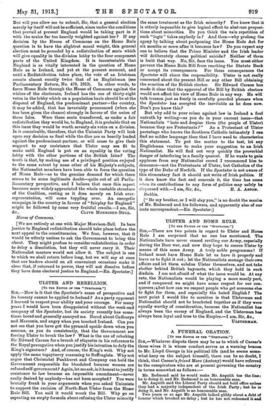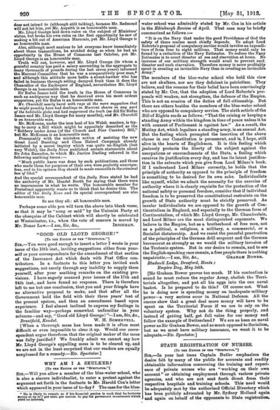A FUNERAL ORATION.
[To TBZ EDITOR OF THR "SPECTATOR."]
Sin,—Whatever dispute there may be as to which of Caesar's three wives it is whose conduct serves as a warning beacon to Mr. Lloyd George in his political life (and he seems some- what hazy on the subject himself), there can be no doubt, I think, that Caesar's friend Marc (Antony) would have referred to the conspirators who are at present governing the country in terms somewhat as follows :—
Mr. Redmond said he would make Mr. Asquith toe the line: he is doing it, and Mr. Redmond is an honourable man.
Mr. Asquith said the Liberal Party should not hold office unless they had a majority independent of the Irish Party; but he is doing it, and Mr. Asquith is an honourable man. Two years or so ago Mr. Asquith talked glibly about a debt of honour which brooked no delay ; but he has not redeemed it and
does not intend to (although still talking), because Mr. Redmond will not let him, yet Mr. Asquith is an honourable man. Mr. Lloyd George laid down rules on the subject of Ministers' virtue, but broke his own rules on the first opportunity he saw of making a bit out of American Marconis, yet Mr. Lloyd George is an honourable man.
Also, although most anxious to let everyone know immediately about these transactions, he avoided doing so when he had an opportunity in the House of Commons last October, yet Mr. Lloyd George is an honourable man. Truth will out, however, and Mr. Lloyd George (to whom a grateful country has paid a salary amounting in the aggregate to many thousands of pounds during the last seven years) informed the Marconi Committee that he was a comparatively poor man,* and although this attitude more befits a street-hawker who has failed in business through selling decayed fruit than it does the Chancellor of the Exchequer of England, nevertheless Mr. Lloyd George is an honourable man. Sir Rufus Isaacs told the truth in the House of Commons in such an ambiguous way that he deceived even his most ardent supporters, yet Sir Rufus is an honourable man.
Mr. Churchill nearly burst with rage at the mere suggestion that he might possibly have had dealings in Marconi shares in any part of the habitable globe and had suppressed the truth (as did Sir Rufus Isaacs and Mr. Lloyd George for many months), and Mr. Churchill is an honourable man.
Mr. McKenna, under the iron heel of his Welsh masters, is try- ing to carry a Bill which might be appositely described as the "Robbery under Arms (of the Church and Poor Curates) Bill," but Mr. McKenna is an honourable man.
Presumably with the mistaken notion of assisting the new Great Land Bursting and Class Hatred Campaign already initiated by a secret inquiry which was quite un-English (but very Welsh), the Daily News published certain statements about Sir John Ramsden, to which Mr. Justice Darling referred in the following scathing terms :— " Much public harm was done by such publications, and those who made them for purposes of their own were perfectly unscrupu- lous, and in his opinion they should be made amenable to the criminal law of libel."
And the special correspondent of the Daily News stated he had the authority of Mr. Handel Booth for saying that there were no inaccuracies in what he wrote. The honourable member for Pontefract apparently wants us to think that he denies this. The editor of the Daily News and its special correspondent are also honourable men.
So are they all : all honourable men.
Perhaps some able pen will turn the above into blank verse, so that it may be "sung or said" by the Unionist Party at the obsequies of the Cabinet which will shortly be celebrated at Westminster, i.e., when the vote of censure is moved by Mr. Bonar Law.—I am, Sir, &c., Inissty A N,



















































 Previous page
Previous page